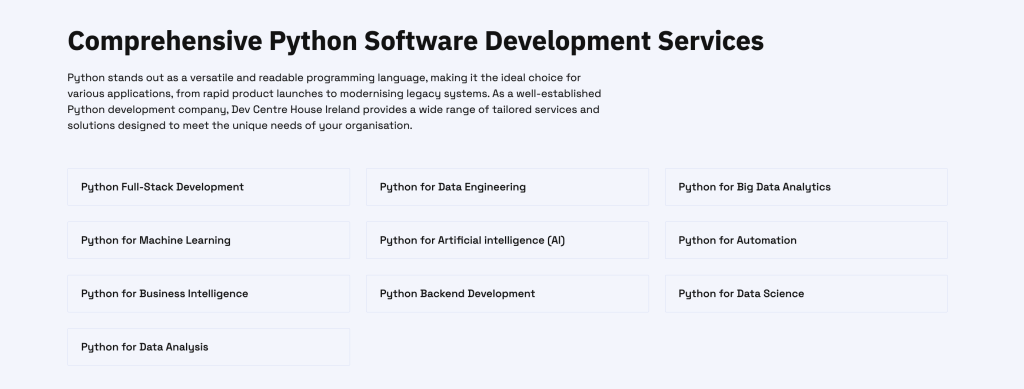Machine learning is revolutionising industries worldwide, from healthcare to finance, by enabling intelligent automation and data-driven decision-making. At the core of this transformation is Python, a programming language widely recognised for its powerful libraries and ease of use. Many of the most innovative machine learning apps today rely on Python to process vast amounts of data, generate insights, and enhance user experiences.
In this article, we explore some of the top machine learning apps developed with Python and how they are making an impact across various sectors.
1. Spotify – Personalised Music Recommendations

Spotify, one of the world’s leading music streaming services, leverages Python-based machine learning algorithms to provide highly personalised recommendations. The company uses a combination of collaborative filtering and deep learning techniques to analyse user behaviour and preferences, ensuring that listeners receive curated playlists that suit their tastes. This machine learning capability enhances user engagement, making Spotify a dominant player in the music industry.
2. Google Photos – Smart Image Recognition

Google Photos is a prime example of how Python-powered machine learning is transforming the way users manage and organise their digital memories. The app’s ability to detect faces, classify images, and suggest edits is driven by sophisticated deep learning models built using TensorFlow, an open-source Python library. With the introduction of Gemini AI, Google Photos now offers even more advanced recognition features, improving search accuracy, automated album creation, and real-time image enhancement, making photo organisation more intuitive than ever.
3. Netflix – Optimising Content Recommendations

Netflix relies on Python-driven machine learning algorithms to enhance user experience through personalised content recommendations. By analysing viewing habits, engagement rates, and even pause points, the streaming giant refines its recommendation engine, ensuring that subscribers receive content suggestions tailored to their preferences. Python’s flexibility allows Netflix to implement large-scale machine learning models efficiently.
4. Uber – Predictive Analytics & Route Optimisation

Uber integrates Python-based machine learning in various aspects of its ride-sharing services. From estimating arrival times and predicting demand surges to optimising routes and detecting fraudulent activity, Uber’s AI models analyse real-time data to improve efficiency. The company’s reliance on Python’s scikit-learn and TensorFlow libraries enables seamless predictive analytics, ensuring a smooth user experience.
5. Instagram – Content Moderation & Engagement Insights

Instagram utilises Python-powered machine learning models to enhance content moderation, detect spam, and provide engagement insights. By employing AI-driven filtering systems, the platform can remove inappropriate content, suggest relevant hashtags, and analyse user interactions. Python’s powerful data processing capabilities play a crucial role in helping Instagram maintain a safe and engaging environment for its users.
6. IBM Watson – AI-Powered Decision Making
IBM Watson, a leading AI platform, is built using Python-based machine learning to assist businesses with data-driven decision-making. From healthcare diagnostics to financial risk assessment, Watson’s cognitive computing capabilities enable organisations to analyse vast datasets, identify patterns, and make informed predictions. Python’s extensive ecosystem supports Watson’s AI-driven insights, making it a valuable tool across industries.
7. Duolingo – AI-Driven Language Learning

Duolingo, a popular language-learning app, employs Python-driven machine learning algorithms to tailor lessons based on user progress. By tracking learning patterns and adjusting difficulty levels accordingly, Duolingo enhances the effectiveness of its courses. Python’s natural language processing (NLP) libraries enable the app to provide real-time feedback and personalised learning paths for users worldwide.
Why Python is the Preferred Choice for Machine Learning Apps
The widespread adoption of Python in machine learning app development is attributed to several key advantages:
- Extensive Libraries & Frameworks: Python offers powerful libraries like TensorFlow, Keras, and scikit-learn, making it easier to build and deploy machine learning models.
- Ease of Use & Readability: Python’s simple syntax allows developers to focus on problem-solving rather than complex coding.
- Scalability & Integration: Python integrates seamlessly with other technologies, enabling businesses to scale their applications efficiently.
- Strong Community Support: A vast developer community contributes to continuous improvements, ensuring Python remains at the forefront of machine learning innovation.
How Dev Centre House Ireland Supports Python-Based Machine Learning Development
For companies looking to develop cutting-edge machine learning apps, Dev Centre House Ireland provides expert Python development services. With a team of skilled engineers specialising in AI-driven solutions, they help businesses leverage Python’s full potential to create scalable and high-performance applications.

Python’s versatility and powerful machine learning capabilities have solidified its position as the go-to language for AI-driven applications. The top machine learning apps developed with Python continue to shape the digital landscape, offering users smarter, more intuitive experiences.
If you’re looking to build a robust machine learning app, partnering with experienced developers like Dev Centre House Ireland can help turn your vision into reality.



